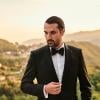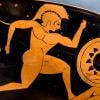
After wowing the crowds — and a huge global TV audience — singing a new arrangement of Gabriel Fauré’s “Hymn to Apollo” at the closing ceremony of the 2024 Paris Olympics, French lyric tenor Benjamin Bernheim had little time to rest on his laurels. Two days later, he was singing the lead role in director Mariame Clément’s new production of The Tales of Hoffmann at the Salzburg Festival, with the rest of his summer and early fall seeing him hopscotch between opera houses.
But good news for Angelenos: Bernheim makes his Los Angeles debut on Nov. 9 at the Wallis Annenberg Center for the Performing Arts in a recital co-presented by Los Angeles Opera. Hailed by Le Monde as “simply stunning,” the tenor will perform French and Italian songs accompanied by his longtime pianist, Carrie-Ann Matheson. The recital coincides with Bernheim’s latest Deutsche Grammophon release, Douce France: Mélodies & Chansons, his first solo song album, recorded with Matheson.

Bernheim, who was born in Paris in 1985 and raised in Geneva, was introduced to singing by his opera-loving parents. Joining the Geneva Conservatory’s children’s choir at age 10, he fell in love with opera when the choir performed in Cavalleria rusticana and Pagliacci at the Grand Théâtre de Genève. Bernheim then studied at the Conservatoire de Lausanne, and in 2008, he joined Zurich Opera’s International Opera Studio, returning two years later as a member of the company’s renowned ensemble.
The tenor has been in high demand ever since being named 2020 Opera Singer of the Year at Les Victoires de la Musique Classique, France’s most prestigious classical music awards. And in 2024, Bernheim was honored as Male Singer of the Year at the International Opera Awards.
SF Classical Voice caught up with the Paris- and Zurich-based tenor by phone, discussing the Olympics, how he prepares for a role, and why singing is like being an athlete. This conversation has been edited for concision and clarity.
OK, let’s get right to the Olympics. You performed Fauré’s “Hymn to Apollo” from the center of a giant Olympic ring while a grand piano was suspended nearby in midair. What was that like? Did you choose the song, and were you surprised at the audience’s reaction?
I didn’t choose it. Thomas Jolly, the artistic director of the ceremonies, wanted to make an eclipse that comes through the past. Fauré was asked in 1893 to compose a French melody about Apollo because specialists [studying] ancient Greece found a stone in Delphi that — in a very, very long poem about Apollo — was referring to the ancient Olympic Games. Fauré rejected [his composition] afterward, but more than 130 years after that, we made a wink to the past to maybe build an arch to the future.
The point of me coming to sing with the piano was not being in the past, not being in the future, but [was a] sort of in-between thing — a real artistic, musicological, and historical moment. [The song] was arranged [for voice and piano, and] we shortened it to make it digestible, to make it good for the audience of today.
I wanted one thing: to be heard as an opera singer, not a pop singer. The reaction was absolutely amazing, [and because] I was born a few kilometers away from [Stade de France, the venue for the closing ceremony], getting to perform at the Olympic Games in my country was really special.

For your L.A. debut at The Wallis, how did you decide on the repertoire, and what makes for a good recital program?
After singing so much opera [in] so many productions and investing a lot of my time [in opera] as a young singer, it took time for me to approach the world of recitals. I always thought of myself more as an opera singer. Now it makes sense to be like an instrumentalist [and] jump from one place to another. I’m making my Asian debut in Tokyo in January 2025, [and] I have a lot of dates in the U.S. for the next [few] years to do recitals.
A good program is sort of a recipe. Every time we go to a new place or [even] a place we know, it’s like bringing food to a new kitchen. We always try to make it a bit of a puzzle — how to bring a few melodies from the same composer and make it a little story, make it a journey. We have [several] songs by [Henri] Duparc, which is [also] what we did with [several] Italian songs by Puccini — make them a little cycle and tell a story.
“Autumn Leaves” is also on [the program]. We wanted to make a cycle of more popular songs, even though some of them are old. When you think of this song, before it’s music, it is text, poetry. It’s about telling a story and bringing the audience on a journey with us.
You made your Metropolitan Opera debut in 2022 in Verdi’s Rigoletto. What was that like, and what do you think of The New York Times writing in its review of the production that your recordings don’t do you justice?
It’s a good thing, a debut. It’s an invitation for people to dress up and come to the concerts to hear a new voice, a live performance. Recordings are amazing. They give an idea, a color, but in the end, there’s nothing like a live voice ringing in a hall. With all the platforms and recordings we have at our disposal, it’s very important to keep the curiosity of going out to hear an instrumentalist, a singer.
Someone asked Pavarotti, “Do you know, Mr. Pavarotti, what is going to come out of your mouth before you sing?” He said, “No, I don’t know.” That’s the magic of it — the risk of a very high note with a big orchestra behind you. It’s very scary. But ask a tennis player if he knows before it happens how [the ball] is going to get in the corner. He worked for it, prepared for it, [but] in the end, there’s nothing like the present moment.
That’s what we go through every night, every moment. It’s a live canvas we paint on. We know the score, we know what we want to achieve, but we don’t know what it’s going to look like when we perform.

You’ve said that you’re never really happy as a performer or as a singer. Can you please elaborate on that?
I could find at every performance a sense of satisfaction, but this is not enough. Being satisfied with something is the death of artistry. Wanting to make it special or give it a different shade is what makes you want more or want better. But not for yourself, for the audience. It’s for art.
I like to take risks with my voice, push it to its limits to tell a story but [also] always find the most elegant way. This is what I’m trying to pursue. Once it’s done, I close the door. It’s in the past. I just pursue. I keep running after something.
My goal is to do more interesting versions, to go even deeper in layers of text or what the music has to offer.
How do you prepare for a role — Hoffmann or Romeo in Charles Gounod’s Romeo and Juliet, for example?
I like to not have one version in my ears. I listen to a lot of different versions with different voices, just to hear different sonorities, different ways of telling the story. At some point in the process, I stop listening, and then I go to the voice studio with a piano. I just sing for myself, to see how I feel. Then I bring a pianist to work on stamina, to build a strategy of when can I sing more, when can I sing less, when can I rest my voice.
These roles — Hoffmann and Roméo — they’re very long roles, [and] we need a lot of strength and steadiness. There’s a process of bringing it together. It’s like playing tennis. You can never know how much it’s going to cost physically to play five sets in the U.S. Open. But you can have a strategy — where to spend your energy, where to save.
Every role is different and brings different challenges, [but] it’s the same process. I played a lot of sports — soccer, tennis, golf — and I am a big fan of the greatest athletes. For me, some athletes who push their potential to the max, they are not athletes. They are artists. Like [Roger] Federer. I am extremely influenced by the biggest athletes of our time because they bring a lot of imagination to our minds. They make us dream, scream, yell, and laugh. These enormous athletes are artists for me [and had] almost as much influence as the biggest singers when I was learning roles.

Do you have any advice for young opera singers?
You can put your head in the opera world, but I think what makes an artist special is to open the mind. Opera is a passion, [and] it’s always important to have influences coming from other worlds. We need colors, shapes, things to fill our minds with ideas. When I see young singers, I say, “Live a life. Try new things. Be risky. Push yourself to try things — snorkeling, scuba diving, I don’t know.”
The dramas in our lives can be traumatic, but [it’s about] being able to use them to express ourselves onstage. I hate the idea that once we have achieved or reached a certain level, we have to keep it like that. Be more adventurous.




